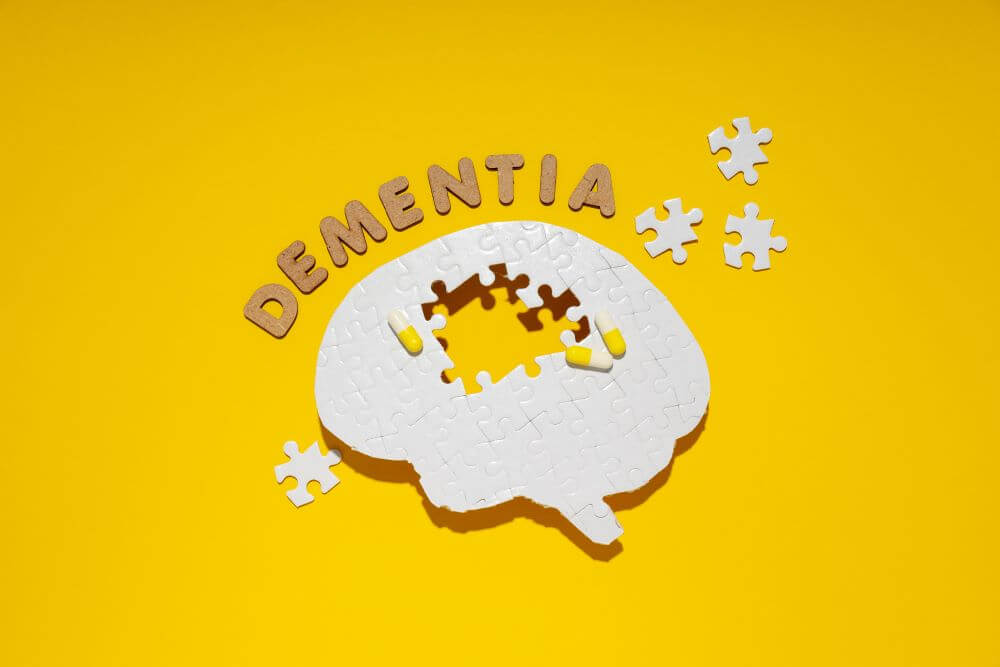Navigating the Dementia Caregiving Journey
Dementia caregiving can be a challenging yet rewarding journey. Understanding how dementia progresses and the caregiving changes that come with it is essential for family and friends. In this guide, we’ll take you through the basics of dementia caregiving, offering insights, practical tips, and real-life examples to help you provide the best care and support.

What Is Dementia?
Dementia is not a single disease but an umbrella term that encompasses a variety of cognitive impairments, with Alzheimer’s disease being the most prevalent. Each type of dementia has unique characteristics and symptoms. Understanding the specific type affecting your loved one is crucial because it informs the caregiving approach. Learn more about Dementia types HERE.
For example, Alzheimer’s disease typically starts with memory problems and confusion. Vascular dementia may result from strokes, leading to sudden changes in thinking and behavior. Lewy body dementia often includes hallucinations and motor difficulties.
Example: Maria’s husband, John, was diagnosed with Alzheimer’s. She educated herself about the disease, its stages, and potential challenges, allowing her to anticipate better and address John’s needs.

The Early Stages
During the early stages of dementia, your loved one may still exhibit a degree of independence. However, you might notice subtle changes in memory and behavior. This is the stage where proactive communication and support can make a significant difference.
One helpful tip is to use clear and straightforward language when discussing important matters. Encourage your loved one to participate in activities they enjoy to maintain a sense of purpose.
Example: Sarah noticed her father repeating questions and becoming frustrated when he couldn’t find his keys. Instead of becoming impatient, she patiently answered each time, reassuring him. She also encouraged him to engage in hobbies like gardening, which he always loved.

Middle Stages – Increasing Challenges
As dementia progresses into the middle stages, caregivers often face a more significant demand for care. Here are some key aspects and types of care that caregivers should be prepared for:
1. Assistance with Activities of Daily Living (ADLs):
- Dressing: Help your loved one choose appropriate clothing and assist with putting it on.
- Bathing: Assist with bathing or showering to ensure safety and cleanliness.
- Toileting: Help with toileting needs and maintain a bathroom schedule.
2. Medication Management:
- Ensure that your loved one takes prescribed medications on time and in the correct dosage.
- Keep a medication schedule to avoid missed doses or double doses. Find more medication tips HERE.
3. Nutrition and Meal Preparation:
- Plan and prepare balanced meals that meet dietary restrictions and preferences.
- Monitor eating habits to ensure adequate nutrition and hydration.
4. Home Safety Modifications:
- Make necessary home modifications to prevent falls and accidents. Find more safety tips HERE.
- Remove tripping hazards, install handrails, and improve lighting.
5. Cognitive Stimulation:
- Engage in activities that stimulate memory and cognitive function, such as puzzles, games, and reminiscence therapy.
6. Behavioral Management:
- Learn techniques to manage challenging behaviors like agitation, aggression, or wandering.
- Maintain a calm and reassuring demeanor to prevent escalation.
7. Respite Care:
- Consider respite care to provide yourself with regular breaks and reduce caregiver burnout.
- Seek help from family members, friends, or professional caregivers.
8. Healthcare Coordination:
- Stay in close contact with healthcare professionals to monitor your loved one’s condition.
- Attend medical appointments and share any changes in symptoms or behavior.
9. Emotional Support:
- Provide emotional support and reassurance to your loved one during moments of confusion or distress.
- Practice active listening and empathy.
📣 Attention Dementia caregivers🔊
𝑼𝒏𝒅𝒆𝒓𝒔𝒕𝒂𝒏𝒅𝒊𝒏𝒈 𝒕𝒉𝒆 𝒑𝒓𝒐𝒈𝒓𝒆𝒔𝒔𝒊𝒐𝒏 𝒐𝒇 D𝒆𝒎𝒆𝒏𝒕𝒊𝒂 𝒊𝒔 𝒌𝒆𝒚!
Our guide on when to call the doctor is a must-read.

Late Stages – Full-Time Dementia caregiving
The late stages of dementia often require full-time care as your loved one’s cognitive and physical abilities decline significantly. Here are the types of care that caregivers should be prepared to provide during this stage:
1. Personal Care:
- Assist with all aspects of daily personal care, including bathing, dressing, feeding, and toileting.
- Be prepared for incontinence management.
2. Mobility Assistance:
- Help with mobility using mobility aids like wheelchairs or walkers.
- Ensure safe transfers between chairs, beds, and other surfaces.
3. Feeding and Nutrition:
- Adjust meal textures to accommodate swallowing difficulties.
- Monitor food intake and fluid intake closely to prevent malnutrition and dehydration. Find more eating tips HERE.
4. Communication Support:
- As speech may be severely impaired, learn alternative communication methods, such as using pictures or gestures.
- Be patient and understanding, even if verbal communication is minimal. Find more about communication HERE.
5. Skin and Bedsores:
- Regularly reposition your loved one to prevent bedsores.
- Maintain proper hygiene and skin care to avoid skin-related complications.
6. Pain Management:
- Be vigilant in assessing signs of pain or discomfort, as your loved one may have difficulty expressing it.
- Consult healthcare professionals for pain management strategies. Learn more about pain HERE.
7. End-of-Life Care Planning:
- Discuss end-of-life wishes with your loved one and their healthcare team.
- Consider hospice care for comfort and emotional support in the final stages.
8. Emotional and Spiritual Support:
- Continue to offer emotional support and companionship, even if verbal communication is limited.
- Provide opportunities for spiritual or religious practices if they were important to your loved one.
9. Professional Assistance:
- Consider enlisting the help of skilled caregivers or hospice professionals who specialize in late-stage dementia care. Learn more about the types of help available HERE.
- Seek guidance from healthcare providers on managing complex medical needs.
In both the middle and late stages of dementia, caregivers should remember to prioritize their own well-being and seek assistance when necessary to ensure that they can provide the best possible care for their loved one. This might include respite care, counseling, or joining support groups to help manage the emotional challenges that often accompany dementia caregiving.
Stay Informed and Organized: Tools for Tracking Dementia Changes
Tracking the changes in your loved one with dementia is not just a beneficial practice; it’s a necessity in providing them with the best care possible. Understanding the progression of the disease and how it affects your loved one’s behavior, memory, and physical health is essential.
To simplify this crucial task and help you stay organized, consider using tools like the Caregiver’s Notebook or the Alzog Caregiver App. These invaluable resources can assist you in documenting and monitoring changes, managing medications, and ensuring you’re equipped with the most up-to-date information for doctor’s appointments and discussions with healthcare professionals.
Taking proactive steps to track these changes not only enhances your caregiving journey but also contributes to better care and support for your loved one.
Conclusion:
Your Journey in Dementia Caregiving
Dementia caregiving is a journey filled with ups and downs. By understanding the basics of dementia, adapting your approach as the disease progresses, and seeking support when needed, you can provide your loved one with the care, compassion, and dignity they deserve.
Remember, you are not alone on this path. Reach out to healthcare professionals, support groups, and resources like our website to help you navigate the challenges and cherish the moments of connection along the way.
The Dementia Caregiver Blog Library
Activities, Advanced Directives, Agitation, Apathy, Approach, Apps for Caregivers, Basic Caregiving, Bathing, Bathroom Safety, Caregiver Burnout, Caregiver Compassion, Caregiver Emotions, Caregiver Help, Caregiver Loneliness, Caregiver Support, Cold & Flu Season, Communication Challenges, Dehydration, Dementia Complications, Dementia Doctors, Dementia Safety Home, Dementia Types, Dementia-Friendly, Dressing Issues, Driving Safety, Eating Problems, Fall Prevention, Family Help, Finances, Guns & Dementia, Harm Prevention, Healthcare, Help at Home, Hiding Dementia, Holidays, Hospice, Hospital Stay, In-Between Stage, Kitchen Safety, Laughter, Legal Healthcare, Marijuana use, Medication Tips, Music, Nutrition, Pain, Patience, Poop Problems, Relationships, Reminiscing, Routine, Safety, Sense of Purpose, Shadowing, Sleep Issues, Stages of Dementia, Sundowning, Television, Time Travel, Traveling, Toileting, Wandering
Exploring Caregiving Tools & Resources? Don't Forget to Check Out My Resource Page! 🌟

Hi, I’m Larea, a Certified Dementia Specialist and Registered Nurse with 30 years of hands-on experience helping dementia patients in various settings, from hospitals to nursing homes and hospice. Drawing on personal experiences with my family members and patients over the years, I’m here to help guide you on your caregiving journey.


